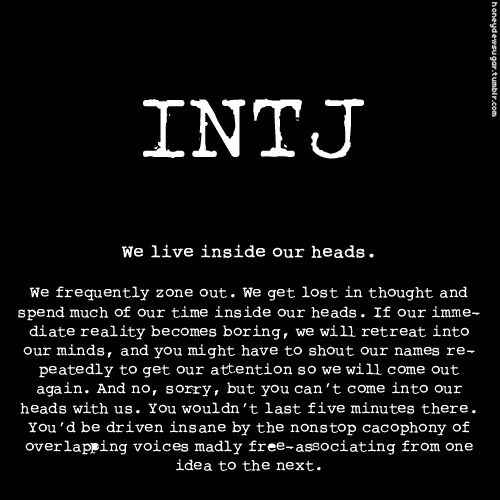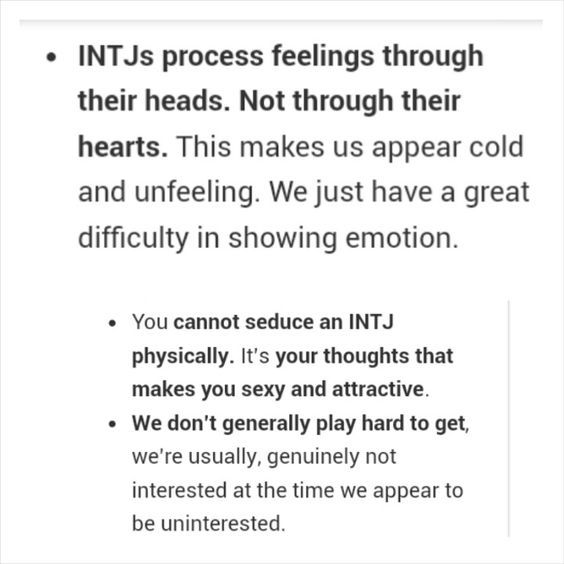Occasionally, as a writer and a complete and utter smart-ass, I trawl through the deeper corners of the Intarwebz in search of information, funny meme images, and to find other writers who, for whatever reason, have decided to remain trapped in the Twelfth Circle of Online Hell known as Tumblr. One thing I’ve started noticing over the past year or so is the obsession therein with the MBTI.
The MBTI is a temperament assessment tool. It measures four “areas” of cognitive processing to determine how, in general and on average, a person will react to common situations and how they will process them. It doesn’t tell you if a person is an asshole, a saint, a liberal, a libertarian, a genius, or a twit. All it says is “this person is, on average, processing things in this manner.”
For instance, I’m an INTJ. That’s the rarest of all types for a woman (and yes, I am a woman). On average, that means that I rely heavily on introverted intuition to process things, I tend to plan ahead in everything, I value efficiency and effectiveness, I’m great at abstract concepts and theories, I like to learn, and I can be about as blunt as a sledgehammer to the head. It also implies that I tend to avoid most social situations, I get worn out in crowds, and I prefer to live in my head.

It does not mean I’m rude. My mother beat manners into me, y’all. It does mean I’m oblivious sometimes (like the time I walked right past the preacher in her church because I didn’t know it was him and, frankly, didn’t really care that much). It means that I tend to have better control over external expressions of my emotions and I tend to control them instead of letting them control me. It doesn’t mean that I’m heartless — though I can come across that way sometimes. It does not give me any excuse to be an asshole just because. No, if I’m an asshole towards someone, I have a reason for my behavior. Generally, though, I’m not much of a jerk to anyone. If I don’t like or don’t trust a person, I just avoid them entirely. I don’t make a big deal out of it.
I’ve written characters who are INTJs (and NTs of all types as well as a lot of NFs). They’re not always the bad guys or the heroes. They’re not Machiavellian-esque. They have no plans to take over the world and rule it with an iron fist. For the most part, they want to be left the fuck alone to chill with their friends (and yes, INTJs have friends. Few of them and only those who can keep up with us but we have them, dammit). Occasionally, one of them will get tipped over into extraverted sensing, go a bit off the rails, and Bad Shit Will Happen. However, they always have a strong moral and ethical code and they will not violate it. And do you know what part of that code is for almost every last INTJ?
It’s don’t be a dick for no reason. Honestly. It’s not so much because we care about how people will feel (though there is some of that to us). No, it’s more the fact that there will be fall-out and we’ll have to spend longer dealing with that than with the actual damned problem. Not being a dick to people for no reason is simply more efficient than being an ass just because we can be. We also don’t need to be dicks to people to get them to leave us alone. Avoiding social situations is something we can do without much effort and being a dick is often counter-productive to that since the person will want to know why we’re being such assholes towards them.
We also generally will plan out how we would, hypothetically, take over a government/nation/the world or destroy a city with minimum/maximum fatalities but, for God’s sake, most of us will never actually get pissed off enough to put those plans into action. After all, if we did that, we’d have to deal with people and, for most of us, limiting our contact with the rest of the world is simply part and parcel of our nature. We don’t hate people (though, in general, most of them annoy us a bit) and we have friends. We can be quite social and even charming at times. But, for the love of Cthulhu, we don’t want to have to do the thinking for everyone and world rulership tends to involve just that.
However, assuming that we’re all Machiavellian sociopaths isn’t the worst offense that writers, Tumblr, and others make about us.
No, the major thing that people get wrong about us is our emotions. See, we have them. We do experience them. We’re not cold, callous, and robotic. Hell, the other day when a man indicated he was interested in me in a manner beyond merely platonic, I felt an honest-to-Cthulhu ten minutes of pure exhilaration, a sharp upward spike in contentment, and enough happiness to actually make me smile for longer than a couple of minutes. However, yes, I did revert back to a slightly-higher baseline level of amused neutrality (more amused-leaning-towards-content than normal). The difference between me and a more normal person is that there were very few outward signs that I was feeling anything in the moment and it actually took me some time to realize that I was feeling something and analyze what I was feeling and trace the cause. Then, and only then, having come to a logical explanation for it did I allow myself to enjoy and indulge in the sensation for a reasonable amount of time.
After that, it was back to normal (albeit a slightly higher baseline level of normal).

I do feel flashes of emotions. I can get angry. I can feel sad. I can feel happy. However, yes, my normal state is neutral and calm. I also know that, for physiological and biochemical reasons, I cannot permit myself to be caught in the grip of a strong emotion for more than a few minutes unless I feel like going to the hospital for a powerful painkiller to rid myself of the migraine that will happen. Most INTJs will show little to no outward expression of an emotion and, if we do experience one strong enough to overwhelm our control, we will excuse ourselves from public view and try to reason our way through it or come to a more logical understanding of just what the hell is going on. That’s how we survive. That’s how we function. It’s not how most people do things and, frankly, I don’t recommend they try. It would be extremely unhealthy for an NF, SF, or ST to attempt to manage their emotions the way an INTJ does. The converse is also true — if we tried to “feel” things the way an NF does, we’d go insane.
That means that yes, powerful emotions can unseat and unsettle us. Especially if those emotions are our own (shit, just witnessing someone else’s emotions tends to frighten us a good bit because we’re not tuned into that, it takes a lot for us to manage to tune-in emotionally, and generally we’re better problem-solvers than we are shoulders-to-cry-on). It means that we can, if it is logical, be driven by an emotion. There have been times when I have been driven by annoyance, anger, outrage, sadness, or joy to do something. *shrug* Not often and generally the emotion peters out and I’ll either continue the action (if logical) or drop it (if I merely needed to exhaust the emotion so I could return to baseline).
INTJs, emotionally, tend to be like very deep rivers, guys. We’re calm and placid on top but the currents down below can be fatal. Unlike a river, we can analyze what is going on “down below” and we will spend time trying to trace the cause and determine if the emotion is logically justified or if it is superfluous. While we’re doing that we will come across as calm and rational because we’re so used to being in that state that it really and truly is no energy for us to maintain (certain rare exceptions aside). When we feel something, it’s generally quite intense.
This is also part of why we tend to be so blunt. Without taking the time and energy to consider that our processing methods aren’t universal, we’ll generally assume that someone wants what they asked for. Over time, we learn better but we do tend to prefer honesty over flattery. Some of you value that — some of you find it annoying. That’s okay. We’re an acquired taste.
— G.K.












